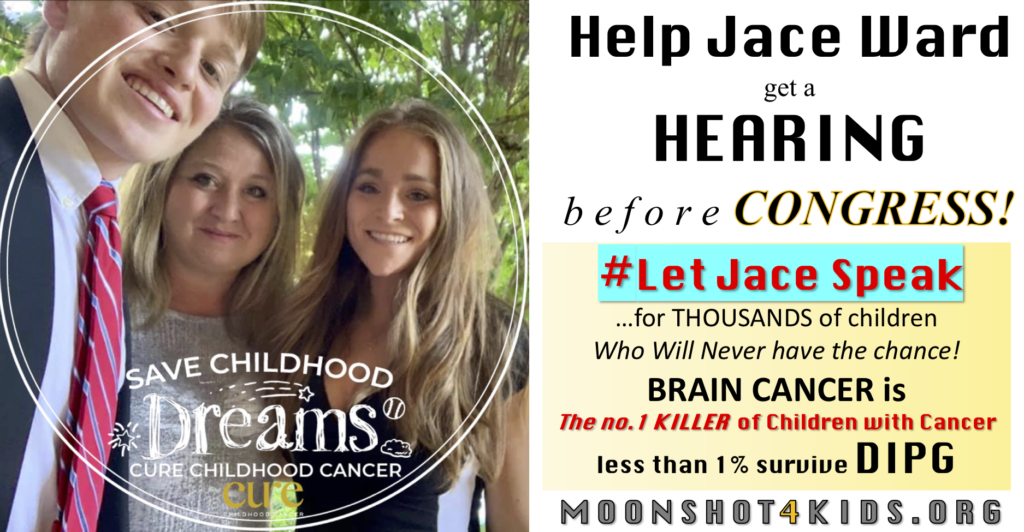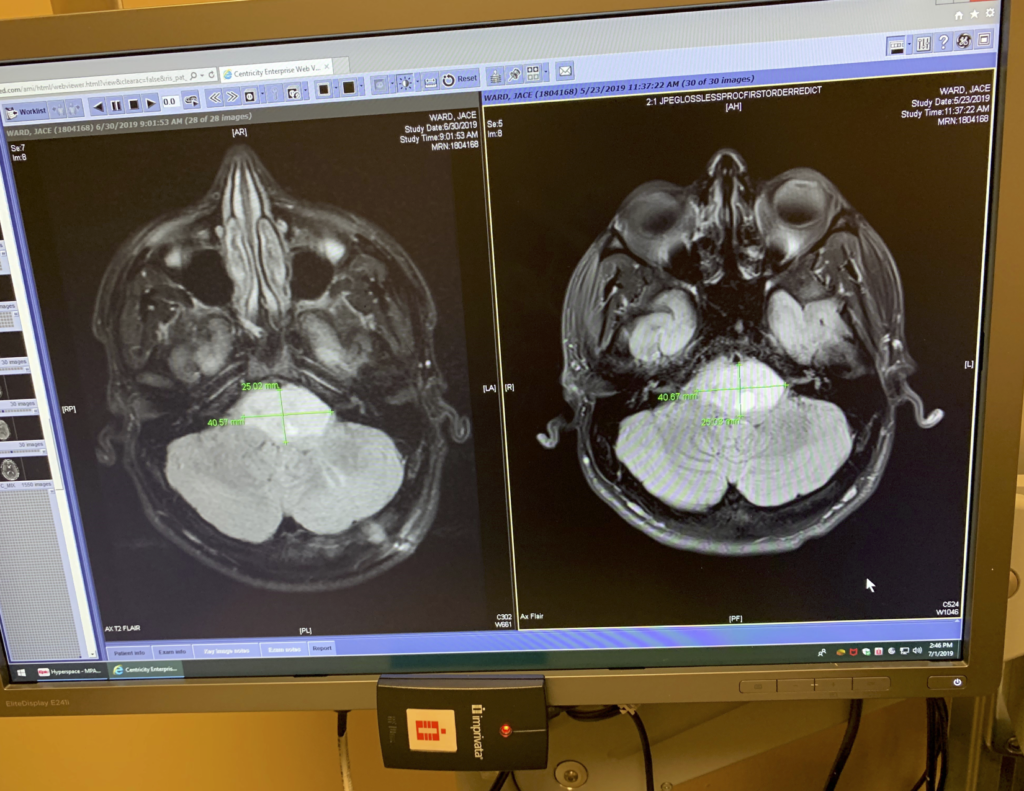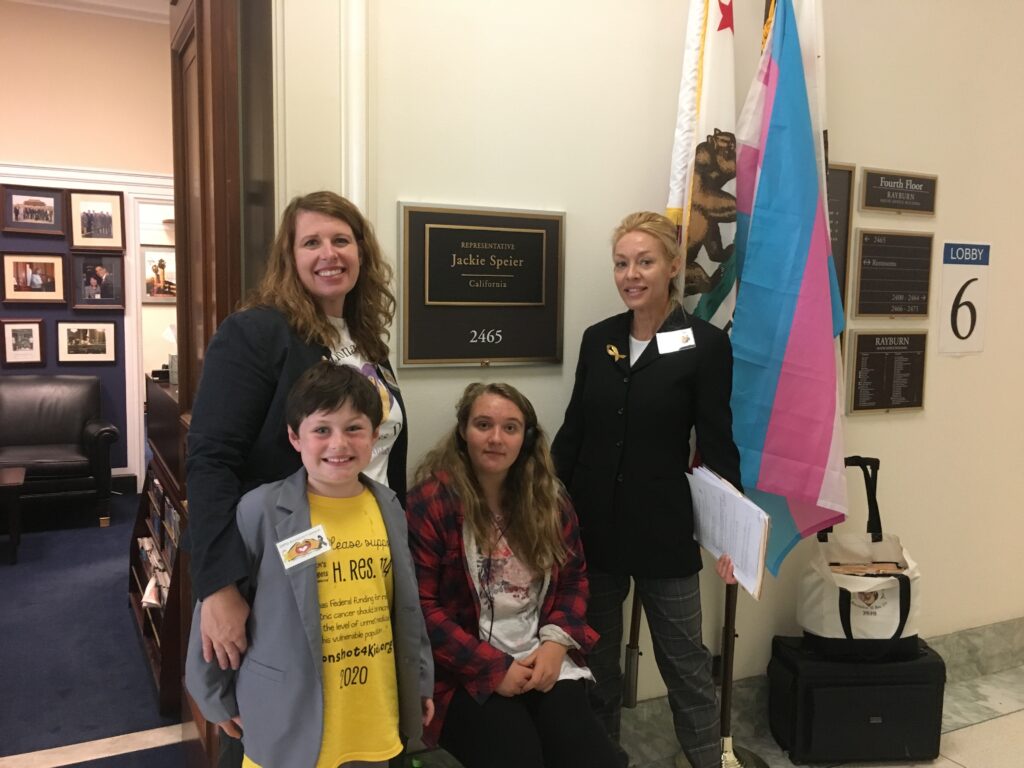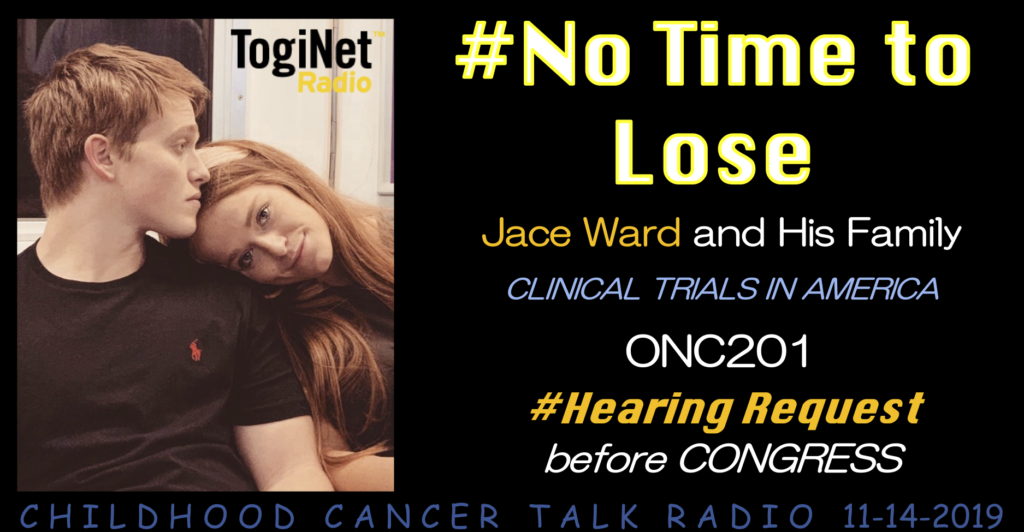
Thursday, Dec. 12, 2019, Santa Clarita, CA–Today a 2nd Hearing Request Letter was sent by the DIPG Advocacy Group to the Energy and Commerce Committee in US Congress for Jace Ward, a 20 year-old pre-law student from Wamego KS, diagnosed on May 17 of 2019 with DIPG, notorious for its less than 1% long-term survival rate. Ironically, this is the date of the proposed National DIPG Awareness Day in H. Res. 114, the DIPG Awareness Resolution, introduced to Congress for the third time on Feb. 8, 2019, by Jackie Speier (D-CA-14) and David Joyce (R-OH-14) amid 17 original cosponsors. The Resolution, which exposes the deadly nature of pediatric brain cancer and the lack of adequate research funding for pediatric cancer in general, suggests simply that that years of life lost and the mortality rate of any given cancer type be given greater consideration in the research grant process with both public and private funding sources. Since the Resolution was first introduced in January of 2016 by Congressman Steve Knight (R-CA-25) and has gone without attention by the Committee to which it was introduced despite ongoing advocacy efforts, roughly 1200 more children have perished to DIPG. Hence the group is asking for a hearing before the Health Subcommittee in the House of Representatives for the direct sharing of pediatric brain cancer information with members of Congress, and from Jace who can tell it like it is.

Brain cancer is the leading cause of cancer-related death in children, and diffuse intrinsic pontine glioma, or DIPG, is the 2nd most common type and is responsible for the majority of pediatric brain cancer deaths annually. Despite the constant death toll, pediatric brain cancer remains one of the least-funded areas of research. According to the National Cancer Policy Board of 2005, “the biological and clinical characteristics of… childhood cancers differ substantially from adult cancers. Market forces are not sufficient to…bring to the bedside new drugs for children with cancer.”
Jace Ward’s proposed testimony before Congress represents a rare and unique opportunity to raise awareness to the issues of pediatric brain cancer and DIPG, as most children diagnosed are very young and do not survive a year past diagnosis. “We feel blessed that Jace has this platform to speak out; he is most concerned with making life better for others through his experience, and his mother, Lisa Ward, an extremely bright and articulate attorney, is a powerful addition to our team with medical advocacy experience; we feel blessed that all this work has led to this moment for Jace,” relays Janet Demeter, president of Jack’s Angels Foundation in Santa Clarita, CA and founder of the DIPG Advocacy Group in 2017 with colleagues Paul Miller, childhood cancer advocate from Littleton CO, and Elizabeth Psar, CEO of the Julia Barbara Foundation in Knoxville, TN. Both Janet and Elizabeth have lost children to DIPG.
For decades, children have been suffering torturous deaths while their families witness the devastation, helpless to save their children. In the US, roughly 400 children are diagnosed with DIPG each year, and over 4000 are diagnosed with brain cancer–11 per day, according to the CBTRUS Statistical Report of 2011. There’s been no change in the standard treatment protocol or prognosis for DIPG since Neil Armstrong’s daughter died of it in 1962, hence the hashtag #Moonshot4Kids for the DIPG Awareness Resolution. In real-time, Jace Ward is facing a highly-probable early death; diagnosed seven months ago, his life expectancy ends one day before his 21st birthday on February 17, 2020. Upon hearing the diagnosis, he simply stated “I’m not afraid to die, I’m afraid I won’t have long enough to make an impact before I die.”

DIPG Advocacy Group has been making trips to Capitol Hill 3-4 times a year since September 2017, bringing information from around the country to share with congressional offices about children affected by DIPG, their next trip scheduled for the week of Jan. 13, 2020. “In Washington, the greatest challenge to our getting information to the Members of Congress about DIPG and the greater problems in the area of pediatric cancer research funding which it powerfully exemplifies has been, quite frankly, differing ideas concerning policy among Congressional staff,” Demeter relates, explaining that even with constituent requests for support from their district, some staffers simply will not transmit the information because of the idea that “the House doesn’t do awareness days anymore,” which, upon closer examination of the actual rules conference from which this idea comes, is false.
Protocol 7 of Rule 28 of the 114th Republican Republican Rules Conference of May 2016, which originally limited the commemoration of individuals and organizations with a period of time, drew a very clear exception with issues of urgency requiring remedial action, and also for bereavement. “This issue is far too urgent for us to wait for policy debate which will never happen,” continues Demeter, asserting that these “quibbles” over policy are obstructing urgently needed awareness for both the public in the world of philanthropy, and in education, that intervention with brain tumors can save lives, an idea championed by her colleague Elizabeth Psar. Psar states plainly that she has met parents at her events in Tennessee who had lost children to brain cancers which may have been operable, and their children’s lives might have been saved if only they had recognized the symptoms.

Paul Miller, long-time advocate for children with cancer, and blood and platelet donor at Children’s Hospital Colorado, does most of the “running rounds” for the group in the Halls of House Office Buildings and has “heard all the objections” to an office recognizing these children facing certain death; “For those offices objecting to recognizing a particular disease, this makes no sense as targeting the deadliest pediatric disease is the only way to ensure a swifter path to a cure. Pediatric research is essential to scientific progress, and our children are not represented in our medical research system; this is aside from the obvious humanitarian obligation we have to our children as a society. Furthermore, H. Res. 114 is a simple House Resolution, not a law, nor does it ask for money…just a day for awareness, and greater consideration for pediatric research,” he clarifies.
During the September 2019 trip to Washington, Jace, his mother Lisa and sister Brooke joined DIPG Advocacy Group in visiting Congressional offices on Capitol Hill in support of the Resolution. “We saw the impact Jace had in focusing staff members close to him in age on the effects of DIPG on his life, in real-time,” explains Lisa Ward. “This sobering realization was also impactful as he continued on to speak to the NIH at a Symposium regarding patient access to genomic data, an event having broad influence and support from private sector companies, government researchers and policy makers who were hopeful to be notified of an upcoming Congressional Hearing.”
Smaller biotech companies concerned with the lack of support for pediatric cancer drug development in the marketplace like Oncoceutics, Inc, based in Philadelphia PA, have stepped forward to tackle this problem, the research funded primarily by parent-led foundations. The promising drug ONC201 is at the center of several issues: accessibility to clinical trials, use of personal medical data, and funding drug production. Al Musella with the MUSELLA Foundation for pediatric brain cancer research has been leading the charge, along with Amanda Haddock, CEO of Dragonmaster Foundation, and other parent-led foundations like Lily LaRue Foundation of Barnegat, NJ headed by Barbara Anderson, to get the necessary funding for ONC201 production and the clinical trial open due to Lisa Ward’s advocacy for her son Jace. Ms. Haddock poignantly describes these difficulties in a recent article on Medium.com, and recently reported that because of the awareness raised with her article, Jace and others were accepted to part of the expanded access to the clinical trial; foundations learned of the problem and stepped up to help. Lisa and Jace Ward describe this journey in detail in a recent edition of Childhood Cancer Talk Radio which aired on Nov. 14, 2019.

To support a hearing for Jace and the importance of the Awareness Resolution, the group has sent its Hearing Request first November 1, and then again today to the Speaker of the House of Representatives as well as to the Health Subcommittee and Energy and Commerce, where the Resolution has sat for years without movement. DIPG Advocacy Group asserts that the Awareness Resolution concept is one of the few avenues by which We The People can ask for support in addressing issues of urgency which would otherwise go unnoticed by the greater public. Demeter insists, “we need this avenue of communication with our lawmakers; our situation does not lend itself to hopeful advocacy. With more wings in the air than we’ll ever have boots on the ground, it’s our plea for help in raising awareness to this issue which gets buried in the politics of the day. We’ll never attain the stature of the larger cancer lobbies…we represent the bereaved and the dead. No one wants to think about dying children, but we parents consider them every day of our lives.”

Included in the request for hearing is the perspective of our country’s most respected experts in pediatric neuro-oncology; most agree that if we can find a cure and methodology to administer it for DIPG, its applications on delivery, immunology and research sharing will drive faster cures for all brain cancers and other deadly pediatric cancers. Included in the Hearing Request Letter is A Joint Statement of Experts was prepared in October 2019 by the following experts: Dr. Adam Green of the University of Colorado, Denver; Dr. Michelle Monje, Stanford University; Dr. Maryam Fouladi, NCI-COG, Children’s Hospital Cincinnati, DIPG Registry; Dr. Sabine Mueller, DIPG Centre of Excellence, Children’s Hospital Zurich, and UCSF; Dr. Charles Keller, Scientific Director, Children’s Cancer Therapy Development Institute, Beaverton, OR; Dr. Mark Souweidane, Weill-Cornell Medicine, NY Presbyterian, New York, NY; and Dr. Maryam Fouladi, Medical Director, Brain Tumor Center Chairman Brain Tumor Translational Research, Children’s Hospital Cincinnati, Professor, UC Department of Pediatrics, CNS Committee Chair, NCI-COG.
The United States Senate unanimously passed this year retroactively on May 23, the National DIPG Pediatric Brain Cancer Awareness Resolution, S. Res. 223, which recognized DIPG Awareness Day May 17, 2019. The leading cosponsors for this measure are Senators Marco Rubio (R-FL) and Jack Reed (D-RI); DIPG Advocacy Group is asking for the Senate’s help once again in 2020, this time for it to pass beforehand for actual press benefit. “With all of our hearts,” Demeter concludes, “we are hoping that the House will allow Jace to bring his testimony about the realities of DIPG to the American People. Most are still unaware that less than 4% of our National Cancer Institute Budget for research directly benefits pediatrics, much less brain cancer, the leading cause of cancer-related death in children. They don’t know about the terror with which we must live, never knowing exactly when, exactly how, or why our children with DIPG must die…and our children, our precious children who must endure this.” Tragically, the tumor, situated in the pons area of the brainstem, robs the child of mobility, swallowing, balance, ear and eyesight, not all equally, until respiration ceases, as witnessed in utter helplessness by their families.
To the NIH Symposium on genomic data-sharing in September 2019 Jace Ward emphasized with clarity and urgency, “While we wait even one year deciding if awareness, shared data and research funding is important enough, 300 children are tortured by DIPG before dying. While we wait, DIPG won’t wait. It won’t wait to take my mobility, my sight, my speech and my life. DIPG won’t wait!”
For more information about how to help support the Congressional Hearing Request for Jace Ward and H. Res. 114, visit Moonshot4Kids.org, the DIPG Advocacy Group on Facebook, or for immediate assistance contact DIPG Advocacy Group directly at 818-400-2724 or [email protected].
_____________________________
DIPG Advocacy Group
℅ Jack’s Angels Foundation staff
32520 Wagon Wheel Rd.
Santa Clarita, CA 91390
661-977-3125 office
818-400-2724 mobile